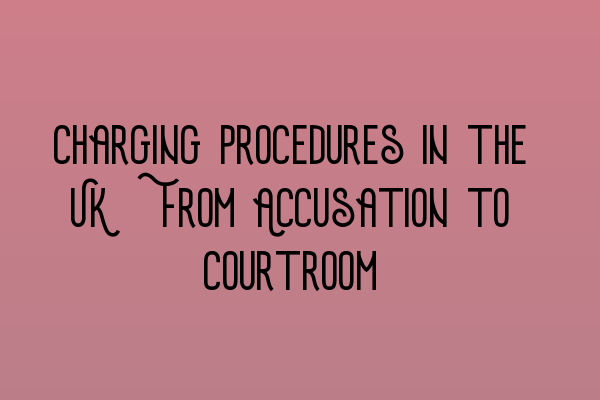Charging Procedures in the UK: From Accusation to Courtroom
When it comes to criminal cases in the UK, charging procedures play a crucial role in ensuring a fair and just legal process. Understanding these procedures is essential for anyone involved in the criminal justice system, whether you are an accused individual, a solicitor, or a legal professional.
1. Initial Accusation
The charging process begins with an initial accusation made by the police or other prosecuting authorities. This accusation is typically based on evidence gathered during the investigation of a crime. It is important for the accusation to be based on reasonable grounds, as this sets the foundation for the subsequent legal proceedings. If you are facing an accusation, it is advisable to seek legal representation as soon as possible to protect your rights.
For a comprehensive guide to preparing for your SQE exams, check out our SQE 1 Practice Exam Questions and SQE 1 Practice Mocks FLK1 FLK2 articles.
2. Investigation
Once an accusation has been made, further investigation takes place to gather additional evidence. This may involve interviewing witnesses, analyzing crime scenes, reviewing CCTV footage, or conducting forensic tests. The goal of the investigation is to gather all relevant evidence to support the accusation and build a strong case.
3. Charging Decision
After the investigation, the prosecuting authorities will make a charging decision based on the evidence collected. This decision determines whether the accused individual will be formally charged with a criminal offense. The decision-making process considers factors such as the strength of evidence, public interest, and legal guidelines.
To prepare for your SQE exams, take advantage of our comprehensive SQE 2 Preparation Courses and SQE 1 Preparation Courses.
4. Court Proceedings
If an individual is formally charged, the case proceeds to court. Court proceedings involve presenting the evidence and arguments from both the prosecution and the defense. The accused individual has the right to legal representation and is presumed innocent until proven guilty.
For the latest information on SRA SQE exam dates, visit our article on SRA SQE Exam Dates.
5. Verdict
After hearing the evidence and arguments from both sides, the court will reach a verdict. The verdict determines whether the accused individual is guilty or not guilty of the charges brought against them. If found guilty, the court will then proceed to sentencing.
Understanding the charging procedures in the UK is crucial for anyone involved in criminal cases. Whether you are an accused individual or a legal professional, knowing the steps involved from accusation to courtroom can help you navigate the system more effectively and protect your rights.
For any legal assistance related to criminal law and practice in the UK, feel free to contact our team of experienced solicitors at SQE Criminal Law & Practice Law UK. We are here to provide expert advice and representation throughout every stage of the legal process.
